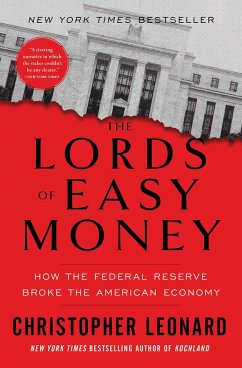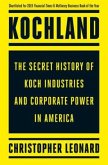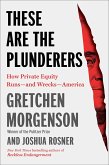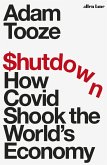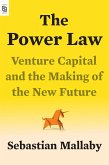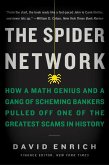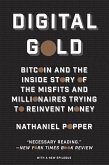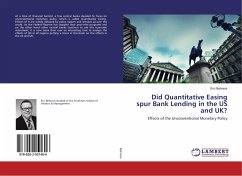The New York Times bestseller from business journalist Christopher Leonard infiltrates one of America's most mysterious institutions-the Federal Reserve-to show how its policies spearheaded by Chairman Jerome Powell over the past ten years have accelerated income inequality and put our country's economic stability at risk.
If you asked most people what forces led to today's unprecedented income inequality and financial crashes, no one would say the Federal Reserve. For most of its history, the Fed has enjoyed the fawning adoration of the press. When the economy grew, it was credited to the Fed. When the economy imploded in 2008, the Fed got credit for rescuing us.
But here, for the first time, is the inside story of how the Fed has reshaped the American economy for the worse. It all started on November 3, 2010, when the Fed began a radical intervention called quantitative easing. In just a few short years, the Fed more than quadrupled the money supply with one goal: to encourage banks and other investors to extend more risky debt. Leaders at the Fed knew that they were undertaking a bold experiment that would produce few real jobs, with long-term risks that were hard to measure. But the Fed proceeded anyway...and then found itself trapped. Once it printed all that money, there was no way to withdraw it from circulation. The Fed tried several times, only to see the market start to crash, at which point the Fed turned the money spigot back on. That's what it did when COVID hit, printing 300 years' worth of money in a few short months.
Which brings us to now: Ten years on, the gap between the rich and poor has grown dramatically, inflation is raging, and the stock market is driven by boom, busts, and bailouts. Middle-class Americans seem stuck in a stage of permanent stagnation, with wage gains wiped out by high prices even as they remain buried under credit card debt, car loan debt, and student debt. Meanwhile, the "too big to fail"banks remain bigger and more powerful than ever while the richest Americans enjoy the gains of a hyper-charged financial system.
The Lords of Easy Money "skillfully" (The Wall Street Journal) tells the "fascinating" (The New York Times) tale of how quantitative easing is imperiling the American economy through the story of the one man who tried to warn us. This is the first inside story of how we really got here-and why our economy rests on such unstable ground.
If you asked most people what forces led to today's unprecedented income inequality and financial crashes, no one would say the Federal Reserve. For most of its history, the Fed has enjoyed the fawning adoration of the press. When the economy grew, it was credited to the Fed. When the economy imploded in 2008, the Fed got credit for rescuing us.
But here, for the first time, is the inside story of how the Fed has reshaped the American economy for the worse. It all started on November 3, 2010, when the Fed began a radical intervention called quantitative easing. In just a few short years, the Fed more than quadrupled the money supply with one goal: to encourage banks and other investors to extend more risky debt. Leaders at the Fed knew that they were undertaking a bold experiment that would produce few real jobs, with long-term risks that were hard to measure. But the Fed proceeded anyway...and then found itself trapped. Once it printed all that money, there was no way to withdraw it from circulation. The Fed tried several times, only to see the market start to crash, at which point the Fed turned the money spigot back on. That's what it did when COVID hit, printing 300 years' worth of money in a few short months.
Which brings us to now: Ten years on, the gap between the rich and poor has grown dramatically, inflation is raging, and the stock market is driven by boom, busts, and bailouts. Middle-class Americans seem stuck in a stage of permanent stagnation, with wage gains wiped out by high prices even as they remain buried under credit card debt, car loan debt, and student debt. Meanwhile, the "too big to fail"banks remain bigger and more powerful than ever while the richest Americans enjoy the gains of a hyper-charged financial system.
The Lords of Easy Money "skillfully" (The Wall Street Journal) tells the "fascinating" (The New York Times) tale of how quantitative easing is imperiling the American economy through the story of the one man who tried to warn us. This is the first inside story of how we really got here-and why our economy rests on such unstable ground.
"A fascinating page-turner....There's something undeniably gratifying about an elegantly crafted morality tale - and the business reporter Christopher Leonard has written a good one....A fascinating and propulsive story about the Federal Reserve - yes, you read that right. Leonard, in the tradition of Michael Lewis, has taken an arcane subject, rife with the risk of incomprehensibility (or boredom), and built a riveting narrative in which the stakes couldn't be any clearer."- The New York Times
"Skillfully tells the story of how, over several decades, a phalanx of economic sophisticates at the Fed have badly misunderstood the U.S. economy and often come up with policies that fail to produce the intended results." - The Wall Street Jornal
"A timely addition-appearing just as inflation is making headlines....Leonard writes vividly about a technical subject....By focusing on a regional banker, Leonard offers a refreshingly non-Washington view....The author is surely correct that many Americans view the Fed as an unelected power aligned with elites, perhaps contributing to the disaffection that exploded on Jan. 6, 2021."- The Washington Post
"It's tough to turn the nuances of monetary policy into personality-driven narrative. But Christopher Leonard has succeeded in doing just that with The Lords of Easy Money....He turns [an] unassuming economist into the protagonist of a compelling tale about how the Federal Reserve changed the entire nature of the American economy... Weaving together narrative non-fiction with big ideas can be difficult. One of the best things about this book is that through Hoenig, Leonard, a business journalist, is able to tell the whole, complicated half-century story of how we got to where we are now in a way that isn't at all wonky. There are real people here, making real decisions about the real world." - The Financial Times
"[A] bracing and closely reported chronicle....Leonard's book is an indispensable account in many respects-his coverage of the invisible bailout of the repo market alone stands as a bracing case study in how the false pieties of quantitative easing directly stoked ruinous asset bubbles. But Leonard is also that rarest of financial reporters who conscientiously tracks the real-life consequences of the Olympian deliberations undertaken by the paper economy's gatekeepers....richly reported, accessible, biting, and long-overdue." - The New Republic
"The book is a timely read to understand what could happen next through a thorough analysis of what this policy intervention looks like on the ground."- Enterprise: The State of the Nation
"We get his point and it is a good one. This has been an era of loose money and the benefits have been very unevenly distributed... The office politics of the Fed are well captured by Leonard, as is the intimidating physical setting." - The New York Times
"Leonard is skilled at explaining complicated financial maneuvering in a way normal people can understand... A good reminder of how uncertain a lot of monetary policy is." - The Washington Free Beacon
"Skillfully tells the story of how, over several decades, a phalanx of economic sophisticates at the Fed have badly misunderstood the U.S. economy and often come up with policies that fail to produce the intended results." - The Wall Street Jornal
"A timely addition-appearing just as inflation is making headlines....Leonard writes vividly about a technical subject....By focusing on a regional banker, Leonard offers a refreshingly non-Washington view....The author is surely correct that many Americans view the Fed as an unelected power aligned with elites, perhaps contributing to the disaffection that exploded on Jan. 6, 2021."- The Washington Post
"It's tough to turn the nuances of monetary policy into personality-driven narrative. But Christopher Leonard has succeeded in doing just that with The Lords of Easy Money....He turns [an] unassuming economist into the protagonist of a compelling tale about how the Federal Reserve changed the entire nature of the American economy... Weaving together narrative non-fiction with big ideas can be difficult. One of the best things about this book is that through Hoenig, Leonard, a business journalist, is able to tell the whole, complicated half-century story of how we got to where we are now in a way that isn't at all wonky. There are real people here, making real decisions about the real world." - The Financial Times
"[A] bracing and closely reported chronicle....Leonard's book is an indispensable account in many respects-his coverage of the invisible bailout of the repo market alone stands as a bracing case study in how the false pieties of quantitative easing directly stoked ruinous asset bubbles. But Leonard is also that rarest of financial reporters who conscientiously tracks the real-life consequences of the Olympian deliberations undertaken by the paper economy's gatekeepers....richly reported, accessible, biting, and long-overdue." - The New Republic
"The book is a timely read to understand what could happen next through a thorough analysis of what this policy intervention looks like on the ground."- Enterprise: The State of the Nation
"We get his point and it is a good one. This has been an era of loose money and the benefits have been very unevenly distributed... The office politics of the Fed are well captured by Leonard, as is the intimidating physical setting." - The New York Times
"Leonard is skilled at explaining complicated financial maneuvering in a way normal people can understand... A good reminder of how uncertain a lot of monetary policy is." - The Washington Free Beacon

